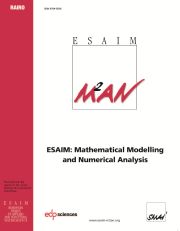Crossref Citations
This article has been cited by the following publications. This list is generated based on data provided by
Crossref.
Krasnyk, Mykhaylo
Mangold, Michael
and
Kienle, Achim
2010.
Reduction procedure for parametrized fluid dynamics problems based on proper orthogonal decomposition and calibration.
Chemical Engineering Science,
Vol. 65,
Issue. 23,
p.
6238.
Haasdonk, Bernard
Dihlmann, Markus
and
Ohlberger, Mario
2011.
A training set and multiple bases generation approach for parameterized model reduction based on adaptive grids in parameter space.
Mathematical and Computer Modelling of Dynamical Systems,
Vol. 17,
Issue. 4,
p.
423.
Beattie, Christopher
and
Gugercin, Serkan
2011.
Structure-preserving model reduction for nonlinear port-Hamiltonian systems.
p.
6564.
Bui, D.
Hamdaoui, M.
and
De Vuyst, F.
2013.
POD–ISAT: An efficient POD‐based surrogate approach with adaptive tabulation and fidelity regions for parametrized steady‐state PDE discrete solutions.
International Journal for Numerical Methods in Engineering,
Vol. 94,
Issue. 7,
p.
648.
Alla, Alessandro
and
Falcone, Maurizio
2013.
Control and Optimization with PDE Constraints.
Vol. 164,
Issue. ,
p.
1.
Lass, O.
and
Volkwein, S.
2013.
POD Galerkin Schemes for Nonlinear Elliptic-Parabolic Systems.
SIAM Journal on Scientific Computing,
Vol. 35,
Issue. 3,
p.
A1271.
Schmidt, A.
Potschka, A.
Körkel, S.
and
Bock, H. G.
2013.
Derivative-Extended POD Reduced-Order Modeling for Parameter Estimation.
SIAM Journal on Scientific Computing,
Vol. 35,
Issue. 6,
p.
A2696.
Kerfriden, P.
Goury, O.
Rabczuk, T.
and
Bordas, S.P.A.
2013.
A partitioned model order reduction approach to rationalise computational expenses in nonlinear fracture mechanics.
Computer Methods in Applied Mechanics and Engineering,
Vol. 256,
Issue. ,
p.
169.
Li, Xinya
Chen, Xiao
Hu, Bill X.
and
Navon, I. Michael
2013.
Model reduction of a coupled numerical model using proper orthogonal decomposition.
Journal of Hydrology,
Vol. 507,
Issue. ,
p.
227.
Kerfriden, P.
Ródenas, J. J.
and
Bordas, S. P.-A.
2014.
Certification of projection-based reduced order modelling in computational homogenisation by the constitutive relation error.
International Journal for Numerical Methods in Engineering,
Vol. 97,
Issue. 6,
p.
395.
Amsallem, D.
and
Hetmaniuk, U.
2014.
Error estimates for Galerkin reduced-order models of the semi-discrete wave equation.
ESAIM: Mathematical Modelling and Numerical Analysis,
Vol. 48,
Issue. 1,
p.
135.
Ardjmandpour, N.
Pain, C.C.
Fang, F.
Buchan, A.G.
Singer, J.
Player, M.A.
Xu, Xu
Navon, I.M.
and
Carter, J.
2014.
Reduced order borehole induction modelling.
International Journal of Computational Fluid Dynamics,
Vol. 28,
Issue. 3-4,
p.
140.
Hernández, J.A.
Oliver, J.
Huespe, A.E.
Caicedo, M.A.
and
Cante, J.C.
2014.
High-performance model reduction techniques in computational multiscale homogenization.
Computer Methods in Applied Mechanics and Engineering,
Vol. 276,
Issue. ,
p.
149.
Falcone, Maurizio
and
Verani, Marco
2014.
Optimization with PDE Constraints.
Vol. 101,
Issue. ,
p.
65.
Lassila, Toni
Manzoni, Andrea
Quarteroni, Alfio
and
Rozza, Gianluigi
2014.
Reduced Order Methods for Modeling and Computational Reduction.
p.
235.
Lass, Oliver
and
Volkwein, Stefan
2014.
Adaptive POD basis computation for parametrized nonlinear systems using optimal snapshot location.
Computational Optimization and Applications,
Vol. 58,
Issue. 3,
p.
645.
Akman, Tuğba
2015.
Local improvements to reduced-order approximations of optimal control problems governed by diffusion–convection–reaction equation.
Computers & Mathematics with Applications,
Vol. 70,
Issue. 2,
p.
104.
Wu, Yuqi
and
Hetmaniuk, Ulrich
2015.
Adaptive training of local reduced bases for unsteady incompressible Navier–Stokes flows.
International Journal for Numerical Methods in Engineering,
Vol. 103,
Issue. 3,
p.
183.
Ştefănescu, R.
Sandu, A.
and
Navon, I.M.
2015.
POD/DEIM reduced-order strategies for efficient four dimensional variational data assimilation.
Journal of Computational Physics,
Vol. 295,
Issue. ,
p.
569.
Zhang, Yi
and
Yim, Solomon C.
2015.
Proper Orthogonal Decomposition of Pressure Field in Sloshing Impact.
Journal of Engineering Mechanics,
Vol. 141,
Issue. 9,


